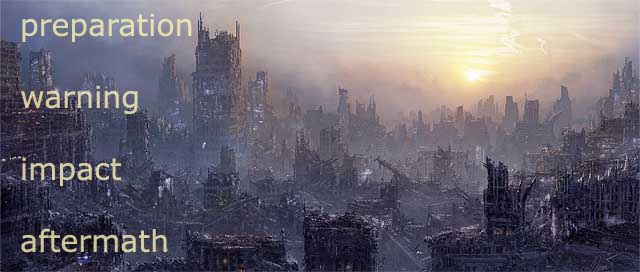 If you think of disaster in the following four stages or phases, then you will be better able to deal with it, should you ever experience it…
If you think of disaster in the following four stages or phases, then you will be better able to deal with it, should you ever experience it…
PREPARATION
One of the biggest challenges of disaster and survival preparedness is convincing yourself (and others) that the risk does indeed exist for the possibility of disaster, and that making preparations and contingency plans are logical, and are a form of life insurance.
Risk awareness. The more who are prepared for disaster, the less negative the impact of the aftermath.
Preparations will vary widely in scope and resources, and at a minimum should be focused on the very basics of preparedness which include water, food, shelter, and security. Start with these categories of preparation and add your own sub-categories within each of them.
Examine your current situation and state of readiness, and consider contingencies if you were to lose what you have. Expand and spread your resources. Figure out how you would adapt. Once you’ve completed this for water-food-shelter-security, move on to other categories as you see fit.
Remember… preparation is not only about the ‘stuff’, it’s about knowing how to use it and your ability to adapt.
WARNING
Disaster can come slow with plenty of warning (for those who are situationally aware) and it can come in an instant.
Increasing your odds of survival and your subsequent ability to effectively recover will be affected by having been adequately warned, or to have recognized the warnings or warning signs as early as possible (and assuming you’ve taken appropriate action).
Some natural disasters are forewarned by technology, e.g. weather radios, media reports, etc., and will provide time to take action (severe weather, tornadoes, hurricanes, etc.,) while other natural disasters occur instantly with little or no warning (earthquakes, tsunamis, mega-solar flare EMP).
An often overlooked warning are those which are more subtle… man-made and often slow in its process of disaster. Example: Our slow motion but ongoing economic collapse…
Our modern world and ‘the system’ that we live within, keeps us distracted from many would-be warnings. Recognizing the warning signs of many potential disasters often requires due-diligence on your part to ‘think’ beyond and outside of the square box that you live within. Meaning… the cocoon of life that surrounds your immediate person, is just that… a cocoon. There’s much more going on out there, on the outside.
Learn to recognize the warning signs.
IMPACT
This is the stage or phase at which the disaster strikes and your preparedness and contingency plans take effect.
Understand (ahead of time) the impact. Know the effects of the impact for each of the disaster scenarios that you are planning for. List them.
The impact stage will be frightful and shocking to the unprepared, which will either result in the inability to take action, and/or will lead to to poor decision making. Many will simply sit and wait for ‘help’. The sad truth is that the vast majority of the public assume and depend upon government (or agencies within the system) to save them or help them.
The thing is, there are scenarios (more than you may think) where help will not be coming… or coming as soon as you think.
During ‘impact’ it is important to remain level-headed, to recognize and understand what has happened, to estimate the follow-on consequences, and to gauge your response and actions accordingly. Adapt.
AFTERMATH
This phase should really be split into time periods.
There is an immediate aftermath, which may involve chaos and a unique set of problems, and there is a longer term aftermath. Both periods have associated with them their own set of preparations and follow-on actions.
After having considered the effects of the disaster’s impact itself, you need to then consider the aftermath for both short term and the long term. Think about how will the aftermath change or affect your life… and for how long.
Think about what will you need to have done ahead of time to survive the aftermath. Think beyond just the supplies, the preps, the stuff… do you have the skills and ability to implement your survival?
This is the phase where preppers win. The ability to adapt to the aftermath.
It’s all food for thought…
Source: Modernsurvivalblog.com
Leave a Reply